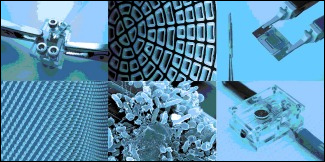Microfabricated Fuel Cells as Power Sources for MEMS

The increasing complexity of portable electronic devices demands energy sources that meet the requirement of delivering a high power density within a reduced size, and in many cases the possibility of achieving complete integration. In this sense, an intense research effort has been focused towards the miniaturization of powering devices in a wide variety of technologies.
A similar trend has been followed in the micro electromechanical systems (MEMS) technology field, where the smart-system concept has impelled the development of a new generation of powering devices, such as batteries, fuel cells or energy harvesters, which altogether are known as powerMEMS. Among the different energy generation systems, micro fuel cells have received special attention due to their particular features, i.e. high energy density, non-toxic emissions and the possibility of avoiding movable parts simplifying the fabrication process and reducing the risk of failure.
Polymer electrolyte membrane fuel cells (PEMFCs) are particularly attractive due to their capability of working at room temperature using both hydrogen and liquid fuels. The possibility to operate using liquid fuels, such as methanol or organic compounds, represent an important advantage for portable applications due to the great simplification of fuel storage and handling processes.
This thesis presents the first developments and technological contributions to the micro fuel cell field performed at IMB-CNM (CSIC). Particularly, this work is dedicated to the design and fabrication of microfabricated fuel cells as power sources to be integrated within the microsystems to be powered.
The work is organized in seven chapters: one introductory chapter and six experimental chapters that have been divided in three sections. The first section describes the development of a micro direct methanol fuel cell using a hybrid approach, which was used to identify and measure the effects that influence the most on the device performance at a microscale. The second section presents different strategies regarding the integration of all micro fuel cell components into a more compact device by taking advantage of microfabrication compatible technologies.
These approaches involved the use of different polymer micropatterning techniques as a way to optimize the device dimensions and reduce materials and production cost. Finally, the third section presents two particular applications of the developed micro fuel cells, a microfabricated bio fuel cell using microorganisms as biocatalysts of organic compounds and a fuel cell powered microfluidic platform that can be of great interest for Lab-on-a-Chip or micro Total Analysis Systems (µTAS).
References
"Microfabricated Fuel Cells as Power Sources for MEMS". PhD thesis defended by Juan Pablo Esquivel Bojorquez, 16 December 2010. Director: Dra. Neus Sabaté.


